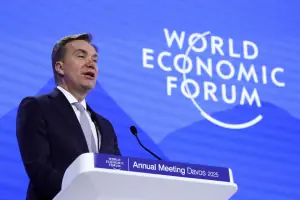Stocks rally on inflation-fighting Fed and BoE
3 min readLONDON: World stock markets rallied Thursday after the US Federal Reserve laid out inflation-fighting plans and the BoE hiked rates from record lows.
Asian equities leapt after the Fed plotted a more hawkish path by speeding up the taper of its pandemic financial support and flagged a number of interest rate hikes over the coming years.
London stocks added to gains after the Bank of England hiked its key interest rate from a record-low 0.10 percent to 0.25 percent, as it seeks to combat decade-high inflation despite fears that Omicron could slow economic growth.
The pound jumped higher on the news.
Eurozone stocks also added to gains after the ECB, as expected held interest rates at record lows, but also signalled it would end pandemic-era stimulus measures in March.
Wall Street jumped Wednesday after the Fed news removed a large amount of uncertainty, and they pushed even higher at the open of trading on Thursday.
Oil prices advanced on strong US energy demand.
Santa Rally
"Is the Santa Rally finally here? Markets certainly seem to have a spring in their step, with the major indices across Europe, Asia and the US all pushing forward," said AJ Bell investment director Russ Mould.
"The US Federal Reserve's monetary policy update last night has gone down well with the markets.
"The prospect of three US interest rate hikes in 2022 would suggest the central bank has a clear plan to not let inflation get out of control. Equally, it isn't being too aggressive to trip up the economy."
Fed policymakers said they would end their bond-buying programme in March, allowing them to begin hiking borrowing costs.
Central banks are grappling with red hot inflation fuelled by reopening economies, runaway energy prices, the supply crunch and resurgent commodities.
Both the BoE's rate hike and even the ECB's announcement that it would end pandemic-era bond purchases signalled policymakers are taking inflation pressures more seriously.
However they also insisted they remain on standby, should Omicron spark new lockdowns and shutter swathes of the world economy once more.
The ECB indicated it would boost non-pandemic support after March, and said it could reactivate bond purchases under the pandemic era programme if needed.
"The ECB clearly did not want to create a cliff edge effect by abruptly reducing total (bond purchases) by 60 billion euros per month," said analyst Fawad Razaqzada at ThinkMarkets.
Despite the ECB now expecting inflation to rise to 3.2 percent next year overall -- above its 2 percent target for a second year in a row -- ECB chief Christine Lagarde said it is "very unlikely" the central bank will raise interest rates this year.
'Slam the brakes'
Investors shrugged off surveys highlighting a December business activity slowdown in both Britain and the eurozone due to fallout from the Omicron coronavirus variant.
Despite the prospect of additional restrictions connected with the spread of the Omicron variant slowing the economy even further, the BoE moved forward with interest rate hikes.
"So, it looks like the BoE decided enough was enough and now is the time to slam the brakes on runaway inflation, with both consumer prices and wages overshooting expectations," said Razaqzada.
"The MPC clearly does not expect the latest Covid-linked restrictions to hurt the economy too badly," he added.
For the latest news, follow us on Twitter @Aaj_Urdu. We are also on Facebook, Instagram and YouTube.





















Comments are closed on this story.